A Combined Prioritization Methodology for Developing Cities to Replace and Decarbonize their Public Bus Networks: Case Study of Ho Chi Minh City, Vietnam
IF 3.3
Q3 TRANSPORTATION
引用次数: 0
Abstract
The research aims to advance decarbonization of transportation by offering a prioritization scheme for replacing fossil-fueled powered buses with low-emission ones. This prioritized replacement scheme of both depot and route conversion is an optimization of a three-phased conversion strategy. It considers the financial costs associated with electric bus (e-bus) deployment and operations, as well as policy mechanisms to support the economic viability of low-emission buses (LEB). The study addresses the mobility transformations research gap of developing cities in a network wide context with the incorporation of LEB models and required policy intervention. The scope of the study includes both 12-meter and 9-meter buses, while considering different technical requirements for both bus types. The results of the study deliver a comprehensive transition roadmap with an embedded prioritization scheme outlined for both bus routes and service depots. The proposed scenario of subsidies and carbon tax policies provides a context of a plausible landscape where low-emission buses remain cost competitive with diesel buses in terms of Total Cost of Ownership (TCO). The case study results explain and illustrate how effective technical and financial measures can help Ho Chi Minh City, Vietnam achieve a trajectory toward a complete green transition of the urban bus network by 2040.
发展城市替代和脱碳公共汽车网络的综合优先排序方法:以越南胡志明市为例
该研究的目的是通过提出以低排放公交车代替化石燃料公交车的优先方案,推进交通运输的脱碳。这种车辆段和路线转换的优先替换方案是对三阶段转换策略的优化。它考虑了与电动巴士部署和运营相关的财务成本,以及支持低排放巴士(LEB)经济可行性的政策机制。本研究通过引入LEB模型和必要的政策干预,解决了发展中城市在网络范围内的流动性转型研究差距。研究范围包括12米和9米巴士,同时考虑到两种巴士类型的不同技术要求。该研究的结果提供了一个全面的过渡路线图,其中包含了公交路线和服务站的嵌入式优先方案。拟议的补贴和碳税政策方案提供了一个合理的背景,即在总拥有成本(TCO)方面,低排放公交车与柴油公交车保持成本竞争力。案例研究结果解释并说明了有效的技术和财政措施如何帮助越南胡志明市在2040年之前实现城市公交网络的完全绿色转型。
本文章由计算机程序翻译,如有差异,请以英文原文为准。
求助全文
约1分钟内获得全文
求助全文

 求助内容:
求助内容: 应助结果提醒方式:
应助结果提醒方式:


